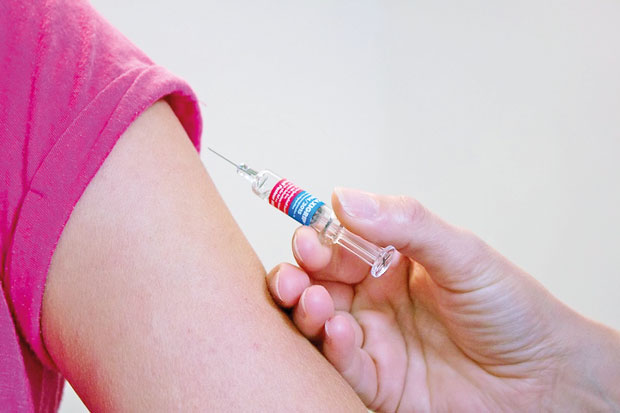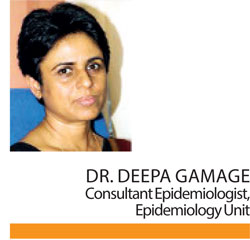03 Nov 2017 - {{hitsCtrl.values.hits}}

We are vaccinating them when they are young because as I mentioned, this is a prophylaxis vaccination. So, getting vaccinated after contracting the virus won’t protect her from HPV or the risk of cancer
 The community has been abuzz with the topic of a new vaccine added to the immunization programme this year. Known as the HPV vaccine, this little vial of fluid brings along many questions to the parents who are concerned about the need and the safety of the vaccine. This is why Health Capsule contacted Dr. Deepa Gamage, Consultant Epidemiologist at the Epidemiology Unit, to obtain more information on the newly introduced vaccine on our readers’ behalf. We hope this article would help clear existing doubts if any in the minds of readers, especially those who are parents and teenagers.
The community has been abuzz with the topic of a new vaccine added to the immunization programme this year. Known as the HPV vaccine, this little vial of fluid brings along many questions to the parents who are concerned about the need and the safety of the vaccine. This is why Health Capsule contacted Dr. Deepa Gamage, Consultant Epidemiologist at the Epidemiology Unit, to obtain more information on the newly introduced vaccine on our readers’ behalf. We hope this article would help clear existing doubts if any in the minds of readers, especially those who are parents and teenagers.
The letters HPV stand for Human Papilloma Virus and this is identified as the main causative factor for Cervical cancer in women, according to Dr. Gamage. Cervix is the tube like structure attaching the uterus to the vagina, and cervical cancer is the second commonest female cancer worldwide, next to breast cancer. “Research has found that annually, 850 to 1000 patients die of cervical cancer in Sri Lanka”, Dr. Gamage revealed.
The disease is usually identified in people who are aged around thirty years. The risk for this cancer increases with age. The majority of patients who have this cancer fall into the 45-50 year age group. “Even though it isn’t visible on the surface, cervical cancer is a great burden to Sri Lanka,” stressed Dr. Gamage.
These viruses, commonly transmitted sexually, don’t produce acute symptoms like fever, as many other pathogenic viruses tend to do. It means that even though you have the virus within the body, you have no way of knowing, unless an investigation is carried out. Therefore these viruses remain on the epithelial surface of the cervix for years insidiously making cancerous changes in the cervix.
What does the HPV Vaccination has to do with it? HPV has many subtypes called genotypes. The genotype 16 and 18 is estimated to be the cause of 70% of all cervical cancers. Therefore by obtaining this vaccination, which protects against getting infected by the above two HPV genotypes, the risk of developing cervical cancer is greatly reduced in a woman.
About the vaccine 
The vaccine is given as a prophylaxis against HPV, meaning that it’s aim is to prevent the disease from developing in the first place, not treating it. The vaccination is administered in two doses; the second dose taken at least six months after the first dose.
But why is it being introduced to the country now? ”Contrary to the opinion of many, this isn’t a new vaccination to Sri Lanka. It was first introduced in 2010 to the private sector and has been used since. Due to it’s high cost, it wasn’t available in the Government sector up until now. But we have incorporated it into the national immunization programme and it will be available every year from this year to girls in grade six”, explained Dr. Gamage. WHO has also recommended this vaccine as part of the routine vaccinations that are administered in each country.
What about the other girls and young women who have past age 12 by now? The doctor said, “The cost of vaccinating all women above 12 years of age isn’t feasible due to the high price of medicine. We are planning on doing a review after two three years. If possible we will arrange a vaccination programme that covers other age groups as well,” she replied.
Side effects
”We have already vaccinated 4000 girls under the programme and only a few cases were reported regarding those who had suffered side effects. The commonest complaints are the local reactions, like the mild pain and tenderness at the site. This isn’t a cause for concern as the pain will subside in one or two days. Severe reactions to the vaccination are extremely rare,” assured the doctor.
Who are the ones that don’t qualify to receive the vaccine?
The administration of the vaccination is delayed regarding patients who are suffering from acute illnesses like fever and respiratory tract infections, said the doctor. “Also, caution should be exercised when vaccinating children who have known allergies to the contents in the vaccine or with individuals who have shown allergic reactions during the administration of the first dose”, she added. The process of vaccination would be carried out in the presence of a qualified medical officer, who will consider all these aspects before administering the vaccination, she further stressed.
Why should your child be vaccinated?
Some of the readers may pose the legitimate question, “Why should I vaccinate my child to protect her from a disease that she may get in her adult life, or may not get at all?” Dr. Gamage had the answer. “We are vaccinating them when they are young because as I mentioned, this is a prophylaxis vaccination. So, getting vaccinated after contracting the virus won’t protect her from HPV or the risk of cancer”,she explained.
“In addition to the vaccination, the ministry is conducting cervical screening programmes for adult women with the aim of recognizing the cancer in early stages,” she said.
“Cervical cancer is a heavier burden than we realize, providing much pain and suffering. It’s our ultimate happiness as parents to see our children live happy and long lives. By getting your child vaccinated, you can greatly reduce the threat of the shadow of cervical cancer affecting their lives one day,” doctor Gamage concluded.
23 Dec 2024 2 hours ago
23 Dec 2024 3 hours ago
23 Dec 2024 4 hours ago
23 Dec 2024 4 hours ago
23 Dec 2024 6 hours ago